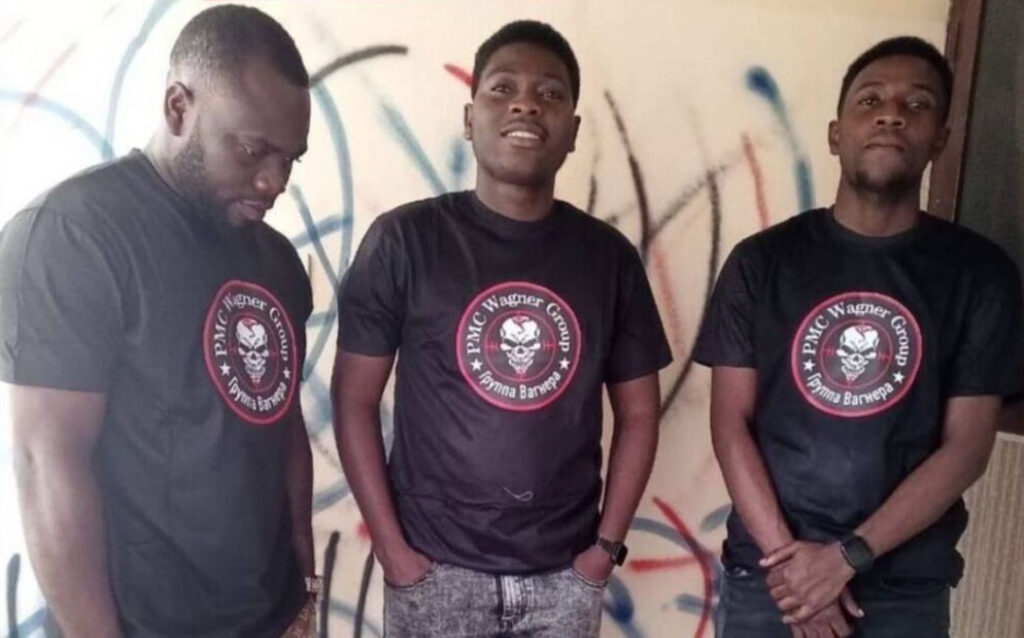ADF STAFF
The Sahel and West Africa have seen their share of crowds waving Russian flags, chanting, and holding posters with pro-Russian and anti-French sentiments.
When a few dozen youths held a “freedom rally” in Diabene community park in Takoradi, Ghana, on August 13, it quickly became clear that the gathering had been coordinated to raise the visibility of Russia’s mercenary Wagner Group.
Ghanaian authorities arrested five people and charged them with “planning to overthrow the government and destabilizing the peace.”
Among them was Michael Asiedu, a 25-year-old blogger with 1,500 followers who posts pro-Russian content on Facebook. He discussed plans for the rally on multiple episodes of a podcast.
“There will be many coups that will be coming,” Asiedu said during the July 29 podcast. “We are planning. I hope the leaders in the military are planning something better.”
Ghanaian journalist Rabiu Alhassan, director of FactSpace West Africa, identified Australian pro-Russia propagandist Simeon Boikov as the host of the podcast and the administrator of some of the Telegram channels that planned and promoted the Takoradi rally.
“He was the figure heard in organizing and grooming the Ghanaians who led the protest,” Alhassan told The Africa Report magazine. “The Ghanaians made appearances on online radio programs and X spaces to share narratives [Boikov] wanted them to advance during the protest.”
Boikov allegedly raised money to pay for T-shirts and Russian flags for the protest.
Assemblywoman Ramatu Ibrahim, who represents Diabene, was shocked by the incident.
“The police said after arrest and interrogation, the boys said they were doing a freedom demonstration and were training on how to wage war against the government,” she told Ghanaian website Citinewsroom.com. “They were promised some money if their planned action becomes successful.”
The Russian Embassy issued a statement on September 20 denying any involvement.
A 2022 study by an organization called the Russian Election Monitor showed how the Kremlin fabricates “artificial pseudo-public support” to facilitate, support and justify its foreign policy objectives.
“This imitation of genuine public activities was long ago named ‘AstroTurfing’, implying the artificial nature of this substitution of true grassroots initiatives,” the report stated.
Russia’s well-documented goals in Africa are to destabilize democracies, prop up authoritarian regimes, sell weapons and exploit natural resources for profit.
Similar strategies have been employed in the Central African Republic, Libya, Mali and Sudan, where the Wagner Group’s atrocious history of human-rights violations have been well documented.
The rally in Ghana exposed some of the early machinations of Russia’s blueprint in Africa, which ultimately seeks to deploy mercenaries and set up shell companies.
“What they did is an example of a deliberate propaganda [campaign],” Mutaru Mumuni Muqthar, of the West Africa Centre for Counter-Extremism, told The Africa Report.
He said Russia and China regularly conduct information warfare in West Africa, “particularly the Russians whose pervasive propaganda and fake news is significant on the continent.”
“[But] it is odd for this to take place in Ghana, a country known for stability, democracy and does not share any resemblance to what is happening in the other West African countries.”
Muqthar and Alhassan agreed that this episode reinforces the need for Ghanaian security agencies to devote more resources to countering misinformation.
“It will be a call on the security agencies to be well-tooled to patrol the online space, including the dark web, to nip it in the bud,” Alhassan said.

